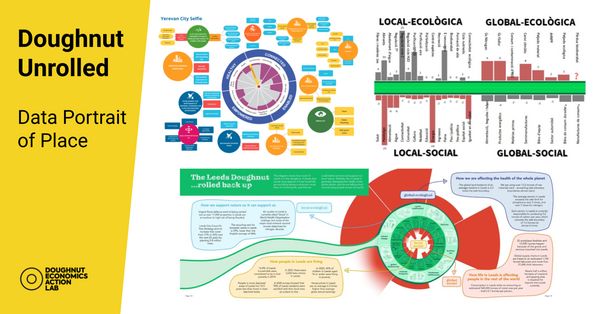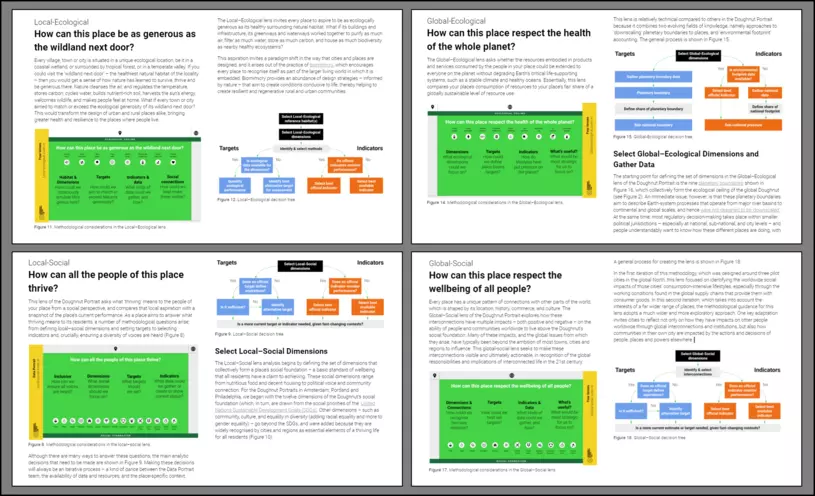
Doughnut Unrolled: Data Portrait of Place
A handbook of approaches for collecting targets and indicators across each of the four lenses for your place

Version 2.2 (January 2024)
📢 Now translated into French, Spanish, German and Brazilian Portuguese
* Cet outil est également disponible en français comme Google Doc ou comme PDF (et avec une feuille de calcul supplémentaire) *
* Esta herramienta también está disponible en español como Google Doc o como PDF (y con hoja de cálculo complementaria). *
* Dieses Tool ist auch auf Deutsch als Google Doc oder als PDF (und mit unterstützender Tabelle) verfügbar. *
* Esta ferramenta também está disponível em português como Google Doc ou como PDF (e com planilha suplementar). *
Overview
The goal of the Doughnut is to meet the needs of all people within the means of the living planet, but what does this mean for the neighbourhoods, cities, districts or nations where we live?
To help explore this question, DEAL has created a set of Doughnut Unrolled tools that unroll the Doughnut into four 'lenses' that consider the interplay between local aspirations and global responsibilities in your place – both socially and ecologically – and identify possible entry-points for transformative action.
This tool - Data Portrait of Place - is a handbook of approaches and useful resources for collecting locally relevant, data-led targets and indicators to create a holistic snapshot or a 'portrait' of your place's performance across each of the four lenses.
For an overview, watch the 18-min video with Andrew Fanning, DEAL's Research & Data Analysis Lead, introducing the Data Portrait of Place tool (recorded in July 2023 as part of this series of videos presenting Doughnut Economics concepts and practice). You can also access his presentation slides online using Google slides, or download the PowerPoint presentation.
The Data Portrait of Place handbook is available as a Google Doc or as a PDF (also available to download below, with accompanying Supplementary spreadsheet).
Why use this tool?
The Data Portrait of Place handbook provides guidance and useful resources for you to create a holistic data-led snapshot of what it means for your place to thrive while helping to bring humanity into the Doughnut.

It invites you to collect and compare desired outcomes versus current performance of your place using available data, offering a 'portrait' to discuss complex issues, which can keep evolving as more data is made available over time. For a collection of useful examples and results from the growing number of places that have already begun using the Data Portrait as an input to transformative action, see the accompanying Data Portraits in Action tool.
DEAL encourages you to use this data-led tool together with the Community Portrait of Place tool, which provides a complementary set of participatory workshop materials that can be used to invite the people of your place to share their knowledge, ideas, lived-experience and aspirations. Together, these tools draw upon both data and other diverse contributions to build a rich, multi-layered and holistic portrait of your place.
Important note: If you wish to use these tools as part of your consultancy or professional advisory services for others, then we require that you follow DEAL's policy for consultancies and professional advisors.
Feedback
Healthy living systems rely on good feedback loops and we invite your comments, reflections and suggestion from using this tool to help us iterate and evolve for future versions.
You can do this in three ways:
- Leave a comment in the section below called Join the conversation. The benefit of this approach is that everyone can see and benefit from what you share.
- Share detailed comments and suggestions in this dedicated Data Portrait of Place online collaborative feedback document.
- Contact the DEAL Team directly via the contact form, choosing the category 'Tools and Stories'.
Acknowledgements
The Doughnut Unrolled methodology was conceptualised by Kate Raworth of Doughnut Economics Action Lab and Janine Benyus of Biomimicry 3.8, and this methodological handbook was written by Andrew Fanning, Kate Raworth, Olya Krestyaninova, and Fredrik Eriksson, with valuable contributions from Rob Shorter, Leonora Grcheva, and Ruurd Priester from Doughnut Economics Action Lab. We are so very grateful to the many, diverse contributors to this tool and earlier versions. Please see the extended acknowledgements section within the handbook for additional details.
Share
Attachments
Doughnut Unrolled - Data Portrait of Place_v2.pdf
Creating-City-Portraits-SuppInfo.xlsx
Doughnut Unrolled - Data Portrait of Place_v2 (translated)-en-de.pdf
Doughnut Unrolled - Data Portrait of Place_v2 (translated)-en-fr.pdf
Creating-City-Portraits-SuppInfo.xlsx (translated)-en-fr-T-C.xlsx
Doughnut Unrolled - Data Portrait of Place_v2 (translated)-en-es.pdf
Creating-City-Portraits-SuppInfo.xlsx (translated)-en-es-.xlsx
Creating-City-Portraits-SuppInfo.xlsx (translated)-en-de.xlsx
Doughnut Unrolled - Data Portrait of Place_v2 (translated)-en-pt_br.pdf
Creating-City-Portraits-SuppInfo.xlsx (translated)-en-pt_br.xlsx
Share
-
Story

Neighbourhood Doughnut Portrait Launch
We're excited to introduce you to the first Neighbourhood Doughnut Portrait, painted by many people together in Ladywood
-
Story

Launching our Data Portrait as an exhibition
A platform for lots of conversations with people and expanding our network in Minato Ward.
-
Story

Doughnut Data Portraits in global South contexts
A co-creative process to reflect global South priorities and interests
-
Story

Glasgow and Barcelona share their Data Portraits
As part of a peer-to-peer gathering organised by DEAL, two research teams shared their evolving Data Portraits
-
Story

Prosperity indicators & the Doughnut portrait
Research question "How does the Doughnut portrait differ from previous prosperity indicator initiatives (if at all)?"
-
Story

Transforming places with the Doughnut - webinar 2
Watch the recording of two local governments working with Doughnut Economics in Brussels, Belgium and Nanaimo, Canada
-
Story

Transforming places with DE - webinar 1
Hearing from community-led initiatives in Leeds, UK and Melbourne, Australia
-
Member

Colleen Cummings
-
Member

Odin Roll-Hansen
Norway, Asker, Brønnøya, Bregneveien
I have listened to some podcast about doughnut economics and found it interesting. I am a carpenter and would like to build environmentally friendly buildings.
-
Member


jean luc legoupil
Le Recif Marseille
En 2024 nous organisons le Global Donut Day à Marseille ! Je reste designer dans mes mains mais je donne désormais tout mon temps pour accélérer la transition vers un monde vivable, pour tous. J'aime développer des initiatives locales, des ateliers d'intelligence collective, de l'aide aux entreprises pour leurs certifications ou leurs bilans carbone. -- I remain a designer at heart, but I now dedicate all of my time to accelerate our transition towards a sustainable world for everyone. This includes local initiatives, workshops, and assisting businesses with their carbon certification or carbon footprint assessments.
-
Member


Dorothée Lamé-Laroche
Nice, France
I spent 15 years in fostering local #economic development and designing major public infrastructure. I worked as Deputy Managing Director for Economy, Innovation, Employment and Int'l at Nice Côte d'Azur Metropolis and used to run Sophia Antipolis Technopolis. I also gained international experience as project director in one of the major French concession and construction company. After realising economic development is a complex issue, in which we need to reconcile economic growth, planetary boundaries and social thresholds, I decided to focus on raising collective awareness about this issue, using the Donut Economic Model, which I find particularly clear and enlightning. I also decided to make a radical turn in my carreer and undertook the transformation of the family farm into an organic farm. I currently pursue my efforts to developping biodiversity within the family farm and help organisations shift their focus from economic development to Donut Economics! Let's shape a fairer and livelier future together!
-
Member


Ewa Sufin-Jacquemart
Warsaw, Poland
I am director of the Polish Green political foundation Fundacja Strefa Zieleni and Board Member of the Green European Foundation. I am also vice president of the Board of the Women's Congress Association (organisation coordinating one of the biggest activist movements in Poland) and Minister of Ecological Transition in the Shadow Cabinet of the Congress of Women. My ambition is to promote the dougnut model in Poland and introduce it in as many cities as possible.
-
Member

Dammer Sahi
-
Member


Asuncion Aguilar
Sophia Antipolis, France and Barcelona, Spain
After 20+ years in corporate strategy consulting and the tech business, I progressively switched my mindset and practices to supporting organizations in their transformational journey towards eco-social-compatible models. 🍩🌍 I am very inspired by the Doughnut Economics concepts and theory and as an action-oriented person pushing for transformative change, I enjoy guiding organizations through their journey to embrace regenerative and distributive dynamics, thanks to the powerful tools developed by the DEAL. I am an experienced facilitator and trainer of several Fresks (playful, collaborative, and creative workshops that raises awareness on several environmental and social issues) such as The Climate Fresk, The Planetary Boundaries Fresk, The Regenerative Economy Fresk, The Agri-Food Fresk, The Digital Fresk … I am engaged in several local initiatives around regenerative economy in my local area (French Riviera in South of France) to bring these concepts and theory into practice, via experimentation at community level. I am delighted to join this rich and inspiring community to engage in meaningful conversations, learn from you and share insights and practices.
-
Member

Melanie ruff


